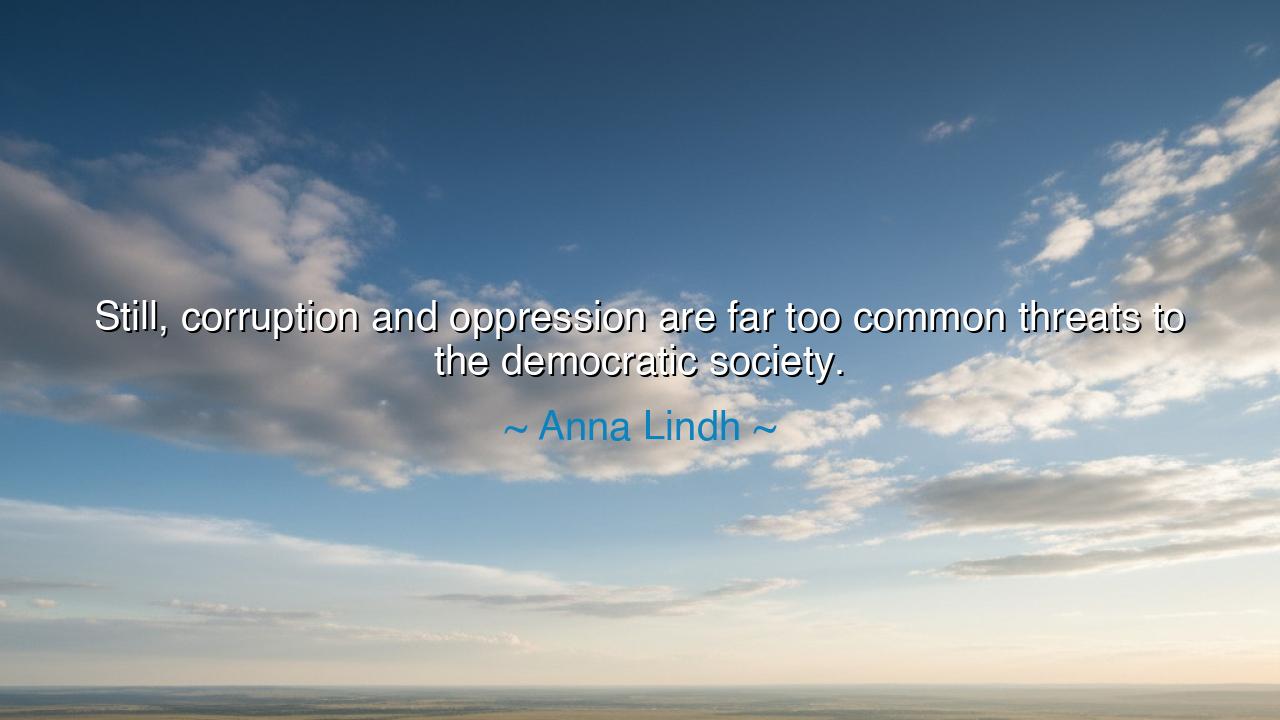
Still, corruption and oppression are far too common threats to






Hear the solemn warning of Anna Lindh, spoken with the clarity of one who loved both freedom and her people: “Still, corruption and oppression are far too common threats to the democratic society.” These words are not the musings of comfort, but the voice of vigilance, a call to remember that the fortress of liberty is not built once and left to stand; it must be guarded each day, for shadows ever creep at its foundations.
The origin of her truth lies deep in the story of mankind. Since the dawn of rule and law, whenever men and women have raised the banner of equality, there too have arisen the hidden serpents of greed and tyranny. For democracy, though radiant, is fragile—it rests not on stone alone, but on the living trust of citizens. When that trust is poisoned by deceit or broken by oppression, the bright flame of liberty flickers, and darkness presses in. Lindh, a servant of Sweden and of humanity, spoke with foresight, knowing that the threats to democracy are not always armies from without, but corruption within, silent and insidious.
History offers us many witnesses to her wisdom. Consider the Weimar Republic of Germany after the First World War. It was born with the promise of democratic renewal, yet its institutions were soon choked by corruption, violence, and oppression. The people, disillusioned, turned to those who promised strength at the cost of freedom. Thus, tyranny arose, and with it the flames of the Second World War. Here, the words of Lindh echo like thunder: democracy without vigilance is a garden left untended, overrun by weeds until fruit no longer grows.
Yet not all stories end in despair. Recall the struggles of South Africa. For decades, oppression reigned under apartheid, silencing the voices of the majority, crushing dignity under unjust laws. But the people did not surrender. They rose, they resisted, and in time, the chains were broken. Still, when apartheid fell, the leaders of the new democracy faced another enemy: corruption within their own ranks. And though freedom had been won, the constant work of justice remained. Thus we see that the enemies of democracy do not vanish with victory; they lurk, waiting for the hour when vigilance grows weak.
What then is the meaning of Lindh’s warning? It is this: democracy is not a gift, but a duty. It demands the labor of every generation. For corruption does not arrive with banners—it arrives in whispers, in secret dealings, in the slow erosion of trust. Oppression does not always wear the face of a tyrant—it sometimes cloaks itself in laws, policies, or silence, when the powerful choose comfort over justice. The threat is constant, and only the awake can guard against it.
The lesson is plain, though heavy: citizens must be watchful, brave, and unyielding. Do not look only to kings, presidents, or parliaments to defend freedom. The strength of democracy lies in its people—when they demand transparency, when they speak against injustice, when they refuse to let fear silence their voices. The smallest act of courage is greater than the loudest corruption, for it keeps the flame alive.
What then shall you do? In your daily life, honor truth above convenience. Question those in power, even when they speak sweetly. Defend those who are silenced, even when their struggle is not your own. Cast your vote not only with your ballot, but with your actions, your speech, your integrity. Teach your children that freedom is fragile, but precious beyond measure, and that vigilance is the price of keeping it whole.
So remember the voice of Anna Lindh, who gave her life in service to justice. Her words are both warning and promise: corruption and oppression are indeed common, but they are not invincible. When the people rise in courage, when hearts are bound in solidarity, the fortress of democracy shall not fall, but endure through the ages.






AAdministratorAdministrator
Welcome, honored guests. Please leave a comment, we will respond soon